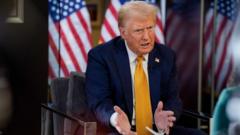In a recent interview with NBC's Meet the Press, Donald Trump, the president-elect, expressed his commitment to revoking birthright citizenship for those born in the U.S., asserting it is an unfair practice. This controversial move, set to begin on his first day in office next month, faces significant constitutional challenges, as birthright citizenship is protected under the 14th Amendment.
Trump's proposed executive actions will also include pardons for Capitol riot participants, many of whom have faced severe legal repercussions for their involvement in the January 6 uprising aimed at overturning the 2020 election results. He emphasized the inhumane conditions some of these individuals are subjected to, claiming they have been imprisoned in unsatisfactory environments for too long.
In his expansive interview, Trump reiterated his strict immigration policies, highlighting continued efforts to deport undocumented migrants while offering to assist 'Dreamers'—those brought to the U.S. as children—to find a permanent solution. However, he clarified that he does not intend to disrupt families by deporting individuals with U.S.-born relatives.
As part of his policy initiatives, Trump mentioned he would assess whether NATO members are meeting their financial obligations before committing to continued U.S. participation. He also stated he would not attempt to limit access to abortion pills, although he left some room for future modifications depending on circumstances.
Despite promises of efficiency in Social Security, no specific details were provided. When questioned about the potential impact of tariffs on consumer prices, he remarked on the uncertainty surrounding economic factors.
Additionally, Trump signaled a reluctance to press criminal investigations against Joe Biden and his family, a notable shift in tone from previous assertions, while still advocating for legal repercussions against members of the House committee that investigated him.
Trump's responses indicate a mix of new and familiar campaign themes as he prepares to resume office and navigate the complexities of governance, amid an increasingly polarized political landscape.
















